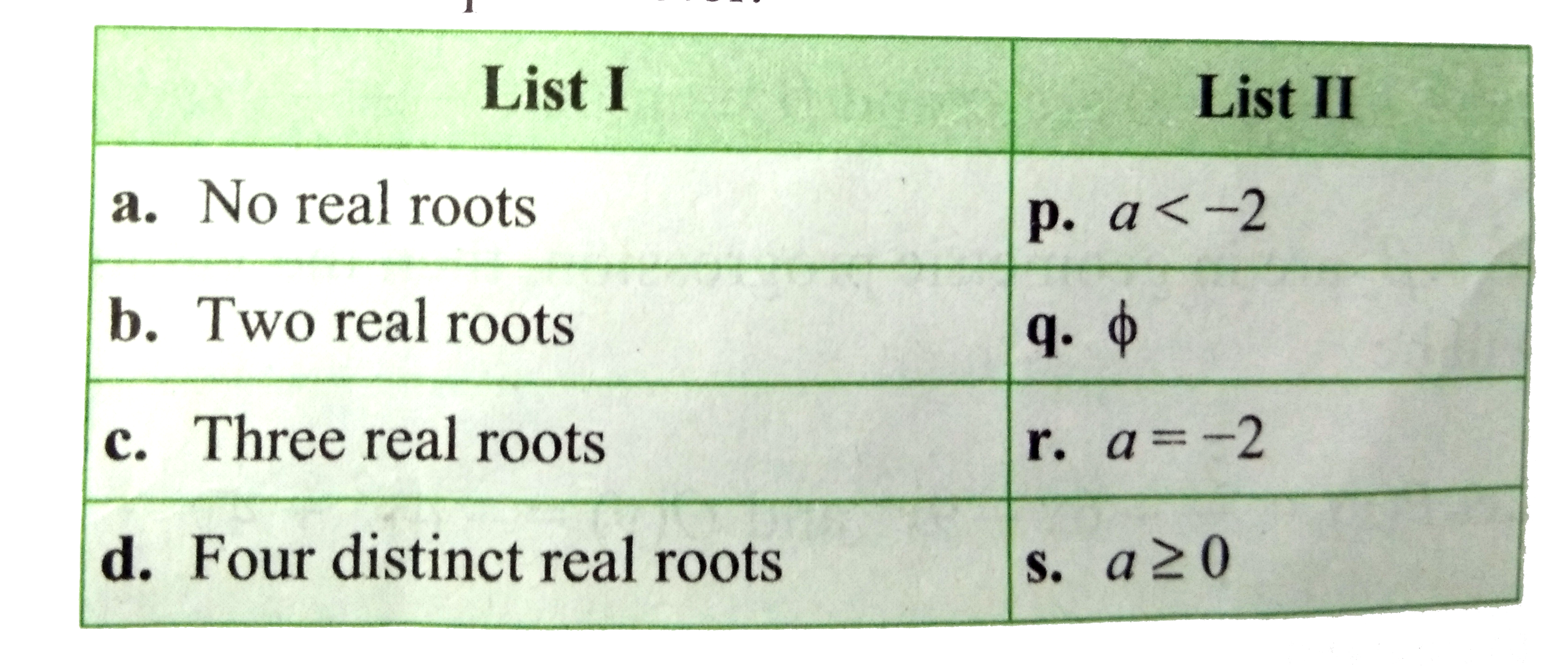lf the quadratic equations x2+bx+c=0 and bx2+cx+1=0 have a common root then prove that either b+c+1=0 or b2+c2+1=bc+b+c. Solution in Bengali
b+c+1=0
b2+c2−1=bc−b−c
b+c−1=0
b2+c2+1=bc+b+c
The correct Answer is:1,4
Equations x2+bx+c=0 and bx2+cx+1=0 have a common roots.
(bc−1)2=(c−b2)(b−c2)
⇒b2c2+1−2bc=bc−b3−c3+b2c2
⇒1+c3+b3=3bc
⇒(1+c+b)(c2+b2+1−b−c−bc)=0
⇒b+c+1=0andc2+b2+1=c+b+bc
Topper's Solved these Questions
- THEORY OF EQUATIONSBOOK - CENGAGE PUBLICATIONCHAPTER - THEORY OF EQUATIONSEXERCISE - Linked Comprechension Type
27 Videos
- THEORY OF EQUATIONSBOOK - CENGAGE PUBLICATIONCHAPTER - THEORY OF EQUATIONSEXERCISE - MATRIX MATCH TYPE
6 Videos
- THEORY OF EQUATIONSBOOK - CENGAGE PUBLICATIONCHAPTER - THEORY OF EQUATIONSEXERCISE - Single Correct Answer Type : Exercise
86 Videos
- STRAIGHT LINESBOOK - CENGAGE PUBLICATIONCHAPTER - STRAIGHT LINESEXERCISE - ARCHIVES (NUMERICAL VALUE TYPE)
1 Video
- THREE DIMENSIONAL GEOMETRYBOOK - CENGAGE PUBLICATIONCHAPTER - THREE DIMENSIONAL GEOMETRYEXERCISE - All Questions
291 Videos
Similar Questions
Let f(x)=x2+bx+c and g(x)=x2+b1x+c1
Let the real roots of f(x)=0 be α,β and real roots of g(x)=0 be α+k,β+k fro same constant k. The least value fo f(x) is −14 and least value of g(x) occurs at x=72
The valueof b1 is
View SolutionMatch the following for the equation x2+a|x|+1=0 where, a is a parameter.

View SolutionThe value of expression x4−8x3+18x2−8x+2 when x=2+√3
View SolutionFor a point P in the plane, let d1(P)andd2(P) be the distances of the point P from the lines x−y=0andx+y=0 respectively. The area of the region R consisting of all points P lying in the first quadrant of the plane and satisfying 2≤d1(P)+d2(P)≤4, is
View SolutionFind the angle between the line whose direction cosines are given by l+m+n=0andl2+m2−n2=0.
View SolutionIf ax2+bx+c=0andbx2+cx+a=0 have a common root and a≠0 then a3+b3+c3abc is A. 1 B. 2 C. 3 D. 9
View SolutionIf the quadratic equations x^(2)+bx+c=0 and bx^(2)+cx+1=0 have a common root then prove that either b+c+1=0 or b^(2)+c^(2)+1=bc+b+c
View SolutionIf x^(2)+bx+c=0,x^(2)+cx+b=0(b!=c) have a common root then b+c=
View SolutionIf x^(2)+ax+bc=0 and x^(2)+bx+ca=0 have a common root,then a+b+c=1
View SolutionIf the equations ax^2+bx+c=0 and cx^2+bx+a=0, a!=c have a negative common root then the value of a-b+c=
View SolutionIf a, b, c are positive real numbers such that the equations ax2+bx+c=0andbx2+cx+a=0, have a common root, then
View SolutionIf the equations x^(2)-ax+bc=0 and x^(2)+bx+ca=0 have a common root, then a + b + c =
View SolutionIf the equation x^2+ax+bc=0" and " x^2-bx+ca=0 have a common root, then a+b+c =
View Solutionlf the quadratic equations x2+bx+c=0 and bx2+cx+1=0 have a common root then prove that either b+c+1=0 or b2+c2+1=bc+b+c.
View SolutionIf a, b, c are positive real numbers such that the equations ax2+bx+c=0andbx2+cx+a=0, have a common root, then
View Solutionयदि द्विघात समीकरणों x2+bx+c=0 तथा bx2+cx+1=0 का एक उभयनिष्ठ मूल हो तो सिद्ध कीजिये कि या तो b+c+1=0 या b2+c2+1=bc+b+c होगा।
View Solution

